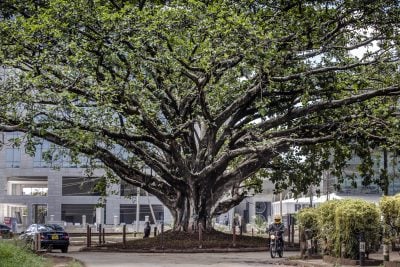In March, when the UK’s lockdown was announced, hotels and tour operators in Africa hurried to bring back British tourists from their holidays. At an upmarket hotel in Gambia, cleaner Kaddy Conteh wept as the holidaymakers departed and her prospect of earning wages for the rest of the year disappeared.
For six months each year, Conteh relies on extended family bringing cash from Europe as loans so that she can educate her children. With Africa’s airspace closed, such informal remittances – estimated at 45 to 65% of formal flows according to the IMF – were now inaccessible. The World Bank estimated in April that remittance flows to sub-Saharan Africa would plunge by 23.1% to $37bn in 2020.
In the following months, however, the formal African remittances market expanded with a succession of deals signed between global and continental remittances firms and fintech businesses, as companies rise to the challenges of Covid-19.
WorldRemit, a UK-based online money transfer company formed in 2010, bought Africa-focused remittance firm Sendwave in August in a deal worth more than $500m. The firm hopes the deal will increase revenues by more than 50% to $280m. Their combined customer base carried out $7.5bn in transfers in the 12 months ending in June.
WorldRemit also partnered with OPay, a Nigerian financial services technology company, and Mukuru, an Africa-based remittances fintech business operating in over 20 African markets. The deal now means there will be no charges for Mukuru customers on cash collections for transactions with WorldRemit.
Rumours of a deal between traditional market leaders Western Union and MoneyGram have not been quashed, and Western Union have publicly stated their interest in acquisitions.
Yet the pandemic and increasing competition have presented an opportunity for newer, nimble firms such as WorldRemit and Mukuru, who use disruptive online technology through smartphones, and often undercut the prices traditional remittance firms charge customers to send money to the continent.
Challenging the legacy players
“The pandemic has driven home the message of digital innovation and financial inclusion,” says Gbenga Okejimi, Nigeria and Ghana country manager at WorldRemit.
“Don’t forget this market was dominated by the legacy players but we’re disrupting the industry and making remittances safer, faster, and at a lower cost to Nigeria’s 17m people in the global diaspora. When you see that inbound remittances have been $25bn consistently for over three years, you realise that the greatest export of Nigeria is actually human resources and not oil, so by formalising remittances and making them cheaper, remittances become one of the key corridors contributing to Nigeria’s national development,” says Okejimi.
For Mukuru, the weakening of the informal trade has meant growth has accelerated since April, says CEO Andy Jury, although the long-term impact of Covid-19 on labour migration is unknown.
“Our core customers from Africa are used to hustling, sending $50 to $70 at a time once or twice a month for lifeblood things like education, farming input seeds or basic medical supplies. They might have had to sacrifice in other ways, but they’ve managed to keep these flows going, and the lockdowns have created that exogenous variable that meant people had to look for alternate means for getting money home.”
PwC says that Nigeria and Egypt receive more than half the inflow of remittances to Africa, and the industry has been boosted by the number of emigrants from sub-Saharan African countries to the northern hemisphere, which grew by 50% or more between 2010 and 2017. Emigrants are mostly young, and those in the productive age group.
While many low-paid migrant jobs have been ravaged by the pandemic, Omomia Omosomi, a manager at PwC, says a second wave of migration from Nigeria after the first wave during the 1980s and 90s has resulted in well-educated professionals leaving Africa’s most populous nation.
Doctors, nurses, and other medical professionals have been part of an ongoing brain drain from Nigeria, she says, meaning an exponential number of remittances return to the continent from such workers.
“The ability of Nigerians to earn money despite Covid-19 has been one of the major factors driving these partnerships. The increasing quality of talent migrating from Africa has been notable, so remittances from Africa will grow faster than all other regions,” says Omosomi.
With the market growing, increasing opportunities exist for governments to tax formal remittances. Inflows now surpass foreign direct investment (FDI), and are seven times larger than foreign aid flows, presenting an enticing target for government revenue collectors.
But the undocumented flows in the informal trade mean total remittances are likely much higher than World Bank estimates. Shipping a used car for repair and sale from London to Lagos counts as a remittance, and it’s impossible to accurately predict just how much cash is carried back in the wallets of Africans flying into the continent.
Bringing in the unbanked
As international travel faces an uncertain future, and smartphone usage accelerates in tune with broadband penetration levels in the region, it’s anticipated that the market will become increasingly formalised. With increased competition, prices are expected to drop, and the formal sector will continue to grow.
“In 2019 remittance flows to GDP in Nigeria were 6%, and net flows of FDI in the same year were 0.5%,” says Omosomi. “That’s huge, and it presents quite an opportunity for fintechs who charge between 1% to 3% for remittance transfers, whereas the traditional remittance centres charge about 7%. This will spur measures to increase things from a financial inclusion perspective, where unbanked customers are able to withdraw remittance cash from an ATM without an ATM card, and this can further leverage the drive for economic development.”
As technology reinvents the financial services sector, platforms like WorldRemit are helping to formalise the industry, by offering services like their WorldRemit Wallet, or OPay’s Mobile Money Service, which allow customers to withdraw or save their cash.
In Nigeria, nearly 40% of adults are unbanked, and the informal economy accounts for up to 65% of GDP, meaning cash still plays a vital role, but mobile phones have transformed the continent and are driving the uptake of formal remittance services.
“We brought the service into the hands of the senders,” says WorldRemit’s Gbenga Okejimi. “We decided from the word go that we’re not undertaking the same operating model like the legacy players, and we are always looking at ways to make remittances cheaper for our senders by embracing developments in new technologies.”
Want to continue reading? Subscribe today.
You've read all your free articles for this month! Subscribe now to enjoy full access to our content.
Digital Monthly
£8.00 / month
Receive full unlimited access to our articles, opinions, podcasts and more.
Digital Yearly
£70.00 / year
Our best value offer - save £26 and gain access to all of our digital content for an entire year!
 Sign in with Google
Sign in with Google 



